Boss Caine just let us know about “Truck Stop Jukebox,” their tribute to Gram Parsons.
We like it:
Sun209: The week in Tweets
- At the @Ryman tonight, Marc Cohn suggested that it could have been "Walking in Nashville" if he had come to Music City first. #Nashville #
- Great show by @TheBonnieRaitt at @TheRyman tonight, with plenty of shout-outs to Nashville folks, including John Prine. #
- Review: Great show from @TheBonnieRaitt at @TheRyman last night http://t.co/kRWk0QGz #nashville #blues #
- Review: We loved @MarcCohn tribute to @LevonHelmRamble at @TheRyman last night. http://t.co/uJxMNNZd #Nashville #americanamusic #
- Just catching up with this terrific story about @ToddSnider and @JerryJeffWalker http://t.co/HdQS66JU #
- .@NoDepression on the great Duck Dunn http://t.co/X9wKF5MH #
- Mark D. Sanders to be honored in Poets and Prophets series at the Country Music Hall of Fame at 1:30 on May 26. #Nashville #countrymusic #
- Top 70 albums from the 70s; decent list, insane ranking. http://t.co/kNOXq5Ma #
- New on the @Americanafest chart: very cool @ToddSnider tribute to Jerry Jeff Walker http://t.co/fU0fx0cP #
- Justin Townes Earle still at #1 @ToddSnider salute to Jerry Jeff Walker enters Americana chart http://t.co/7khJXzMk #
- .@TheDunwells at #40 on this week's Americana music chart http://t.co/mUukfhYP #
- Kris Kristofferson tops 50th anniversary UFW concert tour http://t.co/KR0Ig0Xu via @PopHiss #
- Donna Summer Dead at 63 http://t.co/W1UyEH2E via @rollingstone #
- If you're ever in Nashville, check out "Nashville's bastion of vintage vinyl." http://t.co/fddkCqsT #
- Remembering Doug Dillard: http://t.co/FMufX3pE #
- Tedeschi Trucks Band’s "Everybody’s Talkin’" among most-added albums on week's @Americanafest chart. @DerekAndSusan http://t.co/4WSw1kaZ #
Review: Todd Snider times two
 By Ken Paulson
By Ken Paulson
–Todd Snider’s new album Agnostic Hymns and Stoner Fables may put you a little on edge, but thankfully, he’s also provided the antidote.
Agnostic Hymns could well be the original cast album for the Occupy Movement, with a fair share of contemporary protest songs and attitude.
The opening track “In the Beginning” makes the case that religion was invented to keep the poor from killing the rich. On “New York Banker,” Snider sings “good things happen to bad people.” No happy endings here.
Closer “Big Finish,” sort of a “Hey Jude” for the unraveled, advises “It ain’t the desire that gets you; it’s the hope.” It also contains the best line on the album: When I found myself in possession of these car keys, I just naturally assumed I could drive.”
“Brenda” is a change of pace, melodic and affirming, about either a challenged and enduring couple or the partnership between Keith Richards and Mick Jagger. Probably both.
If you tire of Agnostic Hymns, you need only turn to Snider’s other current album. Time as We Know it: The Songs of Jerry Jeff Walker, is a celebration of the singer and songwriter who helped transform the Austin music scene of the ‘70s. It’s an engaging sampling of Walker’s best known-songs and a handful of intriguing obscurities.
The covers are pretty faithful, with the occasional lyrical liberty. On a terrific version of “Sangria Wine” recorded with Kix Brooks, Snider moves the drinking to East Nashville.
“Taking it as it Comes,” “Jaded Lover,” “Derby Day,” “Railroad Lady” and “Little Bird”(with Elizabeth Cook) all reveal Snider’s obvious affection for Walker, and in turn, Jerry Jeff’s clear influence on Todd.
The two albums are a formidable combination; one contemporary and cutting, the other nostalgic and joyous. Not a bad spring for Todd Snider.
Free Americana music shows at CMA Festival
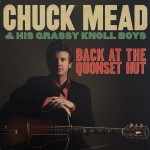 Chuck Mead and his Grassy Knoll Boys, Kenny Vaughan and Trent Summar and the New Row Mob are among the Americana artists who will appear at the free BMI tailgate party during the CMA Music Festival June 7-10 in Nashville. Shows begin at 4:30. Mead is performing in support of his new album Back at the Quonset Hut, recorded at the legendary Nashville studio.
Chuck Mead and his Grassy Knoll Boys, Kenny Vaughan and Trent Summar and the New Row Mob are among the Americana artists who will appear at the free BMI tailgate party during the CMA Music Festival June 7-10 in Nashville. Shows begin at 4:30. Mead is performing in support of his new album Back at the Quonset Hut, recorded at the legendary Nashville studio.
Todd Snider’s salute to Jerry Jeff Walker enters chart
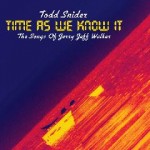 Todd Snider’s Time As We Know It, his tribute to Jerry Jeff Walker, is the top new entry on the Americana Music Association airplay chart this week, breaking in at #33. The Dunwells are the only other debut, with Blind Sighted Faith at #40.
Todd Snider’s Time As We Know It, his tribute to Jerry Jeff Walker, is the top new entry on the Americana Music Association airplay chart this week, breaking in at #33. The Dunwells are the only other debut, with Blind Sighted Faith at #40.
Still at the top of the chart: Justin Townes Earles’ Nothing’s Gonna Change the Way You Feel About Me.Top adds on Americana radio stations: The Wandering’s Go On Now, You Can’t Stay Here, the Turnpike Troubadours’ Goodbye Normal Street (reviewed here) , the Tedeschi Trucks Band’s Everybody’s Talkin’ and Sara Watkins’ Sun Midnight Sun.
Follow Sun209 on Facebook and Twitter (sun209com).
Review: Marc Cohn in concert at the Ryman
We’ve seen Marc Cohn in concert a few times, but he’s never been better than last night at the Ryman Auditorium in Nashville.
Actually it was a bit of a surprise that he was there at all. The night before, he had cancelled a show in nearby Franklin, TN.
Cohn apologized to anyone who had tickets to that show, and said that nothing gets you back on your feet more quickly than opening for Bonnie Raitt at the Ryman.
“It doesn’t get any better than this,” he said.
His set was brief, but compelling. He said he set out one day years ago to explore new places as a cure for writer’s block and found his way to Memphis. That in turn inspired his biggest hit, “Walking in Memphis.”
Cohn laughed and said if he had dropped by Music City first, it could just as easily been “Walking in Nashville,” with Music Row supplanting Beale Street.
The evening’s highlight was “Listening to Levon,” his tribute to the late Levon Helm, which he recorded in 2007 on Join the Parade.
The only disappointment was that Cohn didn’t play anything from his outstanding 2010 album Listening Booth: 1970, a collection of covers from that year. Still, it’s hard to complain when Cohn packed so much great material in a 30-minute set, and closed with “Silver Thunderbird,” a song that should have been every bit as big as “Memphis.”
Review: Bonnie Raitt in concert at Nashville’s Ryman
By Ken Paulson
–Bonnie Raitt’s show at the Ryman Auditorium in Nashville last night was as loose as they come and every bit as entertaining.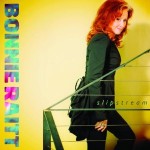
Whether explaining that she hadn’t found time to do a set list, calling former band member Rick Vito to the stage or saluting Nashville’s songwriters, Raitt was casual, comfortable and in command.
She drew heavily from Slipstream, her excellent new album. Songs like “Marriage Made in Hollywood, “Split Decision” and “Down to You” stood up alongside her classics.
A surprise cover on the album and in concert is “Right Down the Line,” the 1978 Gerry Rafferty hit. Stripped of its ‘70s production sheen and infused with reggae, it was a bluesy highlight.
Raitt saluted John Prine and his manager Al Bunetta, and recalled her mom and grandmother in a touching introduction to Prine’s heart-rending “Angel from Montgomery.”
This was a generous set running more than two hours with an extraordinary encore.
Praising songwriters Allen Shamblin and Mike Reid, Raitt delivered their “I Can’t Make You Love Me” in stark and powerful fashion, followed by “Have a Heart.” She closed out the evening sharing vocals with Vito on a raucous version of the 1959 Elvis Presley hit “A Big Hunk O’ Love.”
Raitt – and her music – have aged beautifully.
Sun209: The week in Tweets
- Surprising rock and roll set, Pretenders cover from @wynnonamusic at @Grammys block party in Nashville. #grammysblockparty #nashvillemusic #
- Now I get it. Great set by @LukeBryanOnline at @Grammys block party in Nashville. #
- . @LukeBryanonline, @Wynonnamusic and Mavericks at Grammy Block Party in Nashville. http://t.co/XH7ThtHT #
- .@_KennyRogers joined by @kim_carnes and Don Schlitz in intimate evening at the Country Music Hall of Fame http://t.co/CxOuafDU #
- Zooey Deschanel dropped in at the Ryman Auditorium to sing "Coal Miner's Daughter " w/ Loretta Lynn. Broadway show to come. #onlyinMusicCity #
- Fine piece by Peter Cooper: After fire, Cowboy Jack Clement puts back the pieces of life, home http://t.co/SL7r6TBf #
- Happy Mother's Day: Top 20 Country Songs About Mom, great piece by Tom Roland http://t.co/483d4kcN via @sharethis #
- Bonnie Raitt in Nashville tomorrow night: ‘I Can’t Make You Love Me’ endures | #Ryman #Nashville http://t.co/vVi6zlGa #
- New Bill Lloyd album "Boy King from Tokyo" may be his best. http://t.co/bjjENHJd #americanamusic #nashville #
- Bluegrass on a boat: Check out Mountain Song at Sea http://t.co/nqOxdrmf #sixthman #bluegrass #
- Terrific reissue of classic pop: @MarkLindsay: The Complete Columbia Singles http://t.co/gW8q73PD #
- Check out this podcast interview with Bill Lloyd, Nashville's king of power pop Thanks to @Frkwriter #nashville http://t.co/8wQiLvz7 #
- Congrats to Cowboy Jack Clement on the revival of his Cowboy Arms Hotel & Recording Spa #Nashville #americanamusic #
Reissues: Mark Lindsay: The Complete Columbia Singles
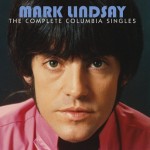 By Ken Paulson
By Ken Paulson
Mark Lindsay: The Complete Columbia Singles is a another fine reissue from Real Gone Music.
“Reissue” may be a misnomer here. Although most of the material has been released before, collcting these largely overlooked singles in one place would have been a daunting challenge for any record collector. This is a singular collection in more wys than one.
Lindsey is an underrated rock ‘n roll frontman, and Paul Revere and the Raiders really don’t get their due as one of the most dynamic bands of the ‘60s.
Interestingly, on The Complete Columbia Singles, we hear how effectively Lindsay distanced himself from the rock ‘n’ roll band that made him famous. His solo work focused on ballads and engaging pop, similar in many ways to B.J. Thomas’ best work.
The big hits are here, including “Arizona,” “Silverbird” and the somewhat dated “Miss America.”
The most interesting covers include Neil Diamond’s “The Grass Won’t Pay No Mind” and Bacharach and David’s “Something Good.” Lindsay clearly enjoyed the challenge of more complex arrangements.
The singles collected here hold up well, capturing early ‘70s pop in all its melodic glory
Kenny Rogers at the Country Music Hall of Fame
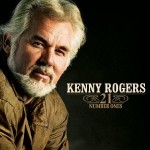 Kenny Rogers concluded his two-night run as artist-in-residence at the Country Music Hall of Fame in Nashville tonight with an intimate set and guest appearances by Kim Carnes and songwriter Don Schlitz.
Kenny Rogers concluded his two-night run as artist-in-residence at the Country Music Hall of Fame in Nashville tonight with an intimate set and guest appearances by Kim Carnes and songwriter Don Schlitz.
Fans accustomed to seeing Rogers in arena had to be thrilled to catch him in the 213-seat Ford’s Theater at the museum. He said he was going to play the show as though it were his living room, and did exactly that in story and song.
Among the highlights:
– Rogers’ duet with Carnes on Don’t Fall in Love with a Dreamer, a 1980 hit she wrote with her husband Dave Ellingson.
– A moving version of John Hiatt’s “Have a Little Faith in Me”
– Schlitz’s cameo on “I’m the Greatest,” his second hit for Rogers. The first – “The Gambler” launched his career and ignited Rogers’.
-A closing story about meeting Jessi Colter on a plane and how her account of being married to Waylon Jennings inspired Rogers to write “Sweet Music Man.”
Rogers also told the audience about pushing to get the Mel Tillis-penned “Ruby, Don’t Take Your Love to Town” recorded. He said the producer thought it might be too dark, an understandable concern given the theme of a disabled veteran mulling homicide. Yet the audience erupted with joyous handclaps throughout the song. So much for darkness.
As with all ten artists-in-residence sessions at the Country Music Hall of Fame, this was a rare and sometimes revelatory evening.
Grammy Block Party 2012
[cincopa AEEAn6qM8Eq_]
The annual Grammy Block Party in Nashville once again featured outstanding Music City-based performers, including the reunited Mavericks, Wynonna, Luke Bryan and Keb’ Mo’.
(photos by Ken Paulson)
Follow us on Facebook and Twitter (sun209com).
Sun209: The week in Tweets
- Review: @tptroubadors "Goodbye Normal Street" out next month http://t.co/6YYkR05z #
- Glad to see photos of the Beach Boys tour, but where are the reviews? Not much written to date. http://t.co/DqzIi4px #
- Today's the last day to get early bird discount for the @americanafest. Always a terrific conference, festival. http://t.co/xc09Ic77 #
- The @Alabama_Shakes leap into the @americanafest chart at #14 #americanamusic http://t.co/0X8Rlzfq #
- .@ToddSnider in Texas all week, full tour schedule here: http://t.co/kcOfIrtc #americanamusic #
- I love this photo of @raywylie. Review of Grifter's Hymnal here: http://t.co/b5EyEpLy #americanamusic #
- Video Premiere: The BoDeans – "All the World" :: Featured Videos :: Paste: http://t.co/ZJeAYTAh #
- Bill Lloyd – yes, that Bill Lloyd – previews the upcoming db's reunion album. http://t.co/lKF4SrFh #peterholsapple #chrisstamey #dB's #
- Long Players salute Neil Young’s Harvest #nashvillemusic #neilyoung http://t.co/VPbMpkn4 #
- Tonight in Nashville: Eric Church, Long Players, Counting Crows, Shawn Camp and Connie Smith. #onlyinmusiccity #
- .@WillieNile song “One Guitar” at heart of effort to raise funds for charity http://t.co/vLzu2od2 #
- Review: @PaulThorn "What the Hell is Goin' On" album http://t.co/lDXYnuUY #americanamusic #
- Best country covers of Bob Dylan songs http://t.co/YMeDiR1E #
Review: Paul Thorn’s “What the Hell is Goin’ On?”
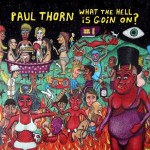 By Ken Paulson
By Ken Paulson
–What the Hell is Goin’ On? is one of the rarest of cover albums, with song selections so right that they don’t sound like covers at all.
Thorn’s albums – including the recent Pimps and Preachers – are filled with colorful characters and unlikely adventures, and the songs he’s selected for this project come from the same neighborhood, including Ray Wylie Hubbard’s “Snake Farm” and “Jukin’” by Al Anderson, Shawn Camp and Pat McLaughlin.
The most unexpected tracks include the early Lindsey Buckingham song “Don’t Let Me Down Again” and “Walk in My Shadow,” a Free cover.
Surprisingly the album’s highlights are the two sweetest songs. “Small Town Talk” was written by Rick Danko and Bobby Charles, and recorded memorably by Jackie DeShannon in 1973 on Your Baby is a Lady. Thorn uses a lighter touch here and nicely updates this 40-year-old song.
Best of all is the beautifully down-to-earth “She’s Got a Crush on Me,” written by Donnie Fritts and Billy Lawson, and recorded by Fritts on his fine One Foot in the Groove album. Sample lyrics: “She puts peanuts in her Coke; she laughs at all my jokes.” Now that’s romance.
Willie Nile’s “One Guitar” at center of charity effort
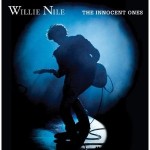 Willie Nile’s anthemic “One Guitar” is at the core of a new charitable initiative. The concept is to encourage hundreds of artists from a wide range of genres to record the song, with all proceeds going to the TJ Martell Foundation and a charity of the artists’ choice.
Willie Nile’s anthemic “One Guitar” is at the core of a new charitable initiative. The concept is to encourage hundreds of artists from a wide range of genres to record the song, with all proceeds going to the TJ Martell Foundation and a charity of the artists’ choice.
You’ll find details at the “One Guitar” site.
It’s no surprise that the song, written by Nile and Frankie Lee, would inspire this kind of effort. This song about an individual taking a stand comes from Nile’s most recent album The Innocent Ones, one of our favorite releases of the past year. It’s a bit of a surprise when an artist with more than three decades of recorded music puts out his best album ever, but The Innocent Ones is exactly that, with energy and inspiration in equal measure.
Review: The reunited dB’s’ “Falling Off the Sky”
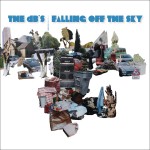 By Bill Lloyd
By Bill Lloyd
–When certain bands reunite, that re-bonding of friendships and talents can do much more than simply echo the past. These musical projects can often have a sense of purpose and pride that creates songs and sounds even stronger than their earlier work.
Everything you ever loved about the music to begin with will still be there and then some. This is what we have with the dB’s reunion. It’s a case of all that and more. Fans of the dB’s from their ‘80’s heyday would be doing themselves a real favor to seek out their new album, Falling Off the Sky.
For those who need some background, the dB’s were a band loved by critics and who had fans everywhere, but never sold a big number of records. Like Big Star before them, they were Southern-bred Anglophiles who instinctively followed their own muse and suffered being called “quirky” for their bravery.
The later success of younger bands from the South like R.E.M. helped broaden the musical landscape from the boogie and blues of the era, but the dB’s paved the way for the change. The acclaim they were able to garner in nearly every important rock’n’roll publication of the era was a clarion call to anyone who appreciated smarts in their lyrics, melody in their songs and a fearless approach to arranging a pop song. They were an influential band to say the least.
Falling Off the Sky finds the original quartet of Chris Stamey, Peter Holsapple, Will Rigby and Gene Holder recording together for the first time since 1982. While principal songwriters Holsapple and Stamey recorded as a duo (Mavericks in 1992 and Here and Now in 2009), the foursome waited a long time to be dB’s again.
Stamey was the first to leave the group after two albums in 1982 to make solo records and produce, which left Holsapple to front the band as the main singer and writer on Like This, The Sounds of Music and Paris Avenue. When Holsapple formed the alt-roots-pop super-group the Continental Drifters with former members of the Bangles, Dream Syndicate and Cowsills, hopes for a dB’s reunion seemed slim.
Will Rigby recorded some solo records and drummed with Steve Earle and Matthew Sweet. Gene Holder mostly stayed in the studio working with bands like Yo La Tengo. This new album sounds like the sum total of all that experience coming into play.
The opening track kicks off the album with a 60’s-era garage-rock blast replete with combo organ. Holsapple singing “Wake up wake up.. That Time Is Gone.” So much for nostalgia. This is about here and now and it rocks.
Stamey follows with the rolling Beatle-esque “Before We Were Born.” sounding like an Abbey Road out-take. Much like the Lennon/McCartney dynamic, you can almost feel Peter and Chris shooting high to match and beat the last song from their musical partners. Drummer Will Rigby, wrote the poppy “Write Back,” a welcome surprise. His drumming has never sounded better. Send Me Something Real may be the album’s highlight, both as a song and as a production piece. It’s a joy to listen to it unfold.
Fans of Chris Stamey’s chamber-pop leanings (anyone remember “27 Years in a Single Day” or “Something Came Over Me?”) will be happy to have “Far Away and Long Ago.”
Holsapple has another one of his heart-tuggers on the record with “I Didn’t Mean to Say That.”
It doesn’t feel like there are false moves on this record. Some of the more experimental inclinations that may have lost the plot for some on past records have been either played down or left behind. The group started recording this collection of songs as early as 2005. There must be another album’s worth of out-takes. I want that too, please.
Through the course of the album, the sonic quality and the band’s performances as both players and singers are stronger than ever. Perhaps because of the accumulated experience working apart from each other or maybe because Chris Stamey, Gene Holder and long-time hometown compatriot Mitch Easter, who helps out here, are all terrific record producers. The fact that they took their time to do it to their own satisfaction shows a wisdom that comes with time.
The years may show, but only in the best way possible. Whatever factors came into play for this album to be as good as it is, they worked. Falling Off the Sky may be the dB’s best album.
Long Players salute Neil Young’s Harvest
The Long Players, a loose aggregation of talented Nashville performers with a very tight band at its core, is a Music City institution – and for good reason.
The band, founded by Bill Lloyd, impeccably re-creates the greatest rock and soul albums of the past 60 years in a concert setting.
Tomorrow night, the Long Players tackle Neil Young’s Harvest at the Mercy Lounge in Nashville.
If you’re in the area, this is a must-see.
Here’s a terrific clip from the Long Players’ 50-album anniversary show:
Review: Bill Lloyd’s “Boy King of Tokyo”
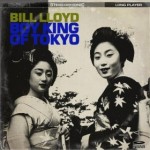 By Ken Paulson
By Ken Paulson
–Bill Lloyd’s new album Boy King of Tokyo is a vibrant and hook-laden collection, rivaling the earlier and excellent Set to Pop and Standing on the Shoulders of Giants. Lloyd took a cue from musical heroes Todd Rundgren and Paul McCartney by playing every instrument on the album.
The high-octane title track was inspired by Lloyd’s early childhood in Japan, and sets the tone for the album. Lloyd loves Badfinger, the Byrds, Big Star and the Raspberries, and it shows.
Some years ago, Lloyd wrote “Cool and Gone,” a haunting and spot-on song (written with David Surface) about fans falling out of love with an artist. It could only be written by a passionate record collector, which Lloyd is. While “Cool” was melancholy, the new album boasts The Best Record Ever Made,” an inspired sing-along that captures the euphoria of a new and perfect pop song: “The best record ever made made you want to turn up to 10 and then you’d play it over and over and over again.”
The new album is a bit more socially conscious than past efforts, including “Com-Trol,” a clever take on the corporatization of rock ‘n’ roll.
On the flip side, “Indubitably” and “Home Jeeves” are fun and buoyant slices of pop and rock and pop.
“Chet’s Right Hand, Man” is a surprise instrumental, echoing Chet Atkins’ style. Lloyd said he wrote it to entertain visitors at the Country Music Hall of Fame, where he once worked as stringed instrument curator.
Lloyd teamed up with Radney Foster for an excellent reunion album last year, but pure pop remains his passion. Turn it up to ten.
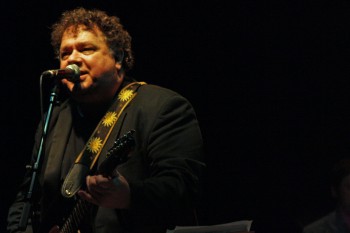
Bill Lloyd at his album release party
Review: Ray Wylie Hubbard’s “Grifter’s Hymnal”
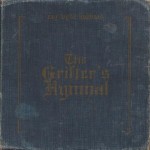 By Paul T. Mueller
By Paul T. Mueller
–If music reviews included credit for style points, Ray Wylie Hubbard’s latest effort would earn plenty of them for its title alone. The Grifter’s Hymnal? Who but “the Wylie Lama” could have even imagined such a thing, much less fill it up with a batch of cool songs?
Great title aside, this Hymnal has a lot going for it. Hubbard started out as part of what Steve Fromholz once called “the great progressive country scare of the seventies” and spent some years wandering down unproductive paths, but after dealing with some bad habits a while back, he’s been making the most of his second shot at the music business.
The Grifter’s Hymnal is another in a string of fine albums he’s turned out in recent years. Mostly bluesy rock with a little Texas twang thrown in, it’s a collection of musings on life, death, salvation and rock ‘n’ roll, all filtered through Hubbard’s unique consciousness.
The playing here is excellent, featuring Ray Wylie on various guitars, his son Lucas on electric guitar on several tracks, Rick Richards on drums and percussion, and George Reiff (who co-produced with Hubbard) on bass for most of the tracks. Other artists include guitarists Brad Rice, Audley Freed and Billy Cassis, keyboardist Ian McLagan (formerly of the Faces and the Small Faces, now living in Austin) and Ringo Starr (yes, that one) singing and playing backup on Hubbard’s version of Starr’s “Coochy Coochy.”
The standout track here is “Mother Blues,” named for an old-time Dallas nightclub. It’s a wildly entertaining account of how a young Hubbard came to acquire a classic goldtop Les Paul guitar and eventually passed it on to his son (who’s credited with playing the very same instrument on the track). More than that, it’s the story of Hubbard’s career as a musician and his journey through life – and whether all the lurid details in this nearly six-minute opus are strictly factual is pretty much beside the point. Hubbard ends the song with a litany of people and things he’s grateful for (including the chance to share a stage with his son) and concludes, “The days that I keep my gratitude higher than my expectations – well, I have really good days.” That’s wisdom worthy of a lama.
Other highlights include “South of the River,” another tribute to the musician’s life that moves from Chris Whitley-style acoustic blues to Exile-era Stones-y boogie, fueled by McLagan’s honky-tonk piano, and “Red Badge of Courage,” a quietly furious antiwar rant that concludes, “We was just kids doing the dirty work/For the failures of old men.”
Hubbard cranks up his slide guitar on the lively “New Year’s Eve at the Gates of Hell,” in which he imagines defending his life at the Last Judgment (“By the way, kid, why am I here, when I wasn’t that bad? I just never liked churches, but I never wore plaid”). Many amusing music-biz references later, he ends up admitting, “The truth of the matter is, I really can’t sing/But I can quote Martin Luther King.”
Not all of the songs are quite that accessible. As befits a spiritual leader, Hubbard can be a little cryptic with his lyrics. There’s surely some deeper meaning in there somewhere, or maybe not; just go with the flow and enjoy The Grifter’s Hymnal for its fine songcraft and topnotch playing.

Photo of Ray Wylie Hubbard by Paul T. Mueller
Charting: Alabama Shakes, Nanci Griffith, Jason Eady
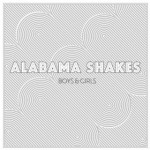 The Alabama Shakes jump into the Americana Music Association airplay chart at #14 this week with Boys and Girls.
The Alabama Shakes jump into the Americana Music Association airplay chart at #14 this week with Boys and Girls.
Other chart debuts: Nanci Griffith’s Intersection at #34, Jason Eady’s AM Country Heaven at #36, Hank Williams III’s Long Gone Daddy at #37 and Madison Violet’s The Good in Goodbye at #39.
Most added this week: Paul Thorn’s What The Hell Is Goin On? Marty Stuart and His Fabulous Superlatives’ Nashville, Volume 1: Tear The Woodpile Down and Todd Snider’s Time As We Know It.
Americana music news: Follow us on Facebook and Twitter at @sun209com.
Review: Dar Williams’ “In the Time of Gods”
 By Ken Paulson
By Ken Paulson
— Dar Williams on her new album In the Time of Gods: “I thought why don’t I really freak out my record company and make a whole album about Greek mythology?”
Note to Dar: This has a similar effect on music writers.
In the Time of Gods works on a couple of levels, the first being the Parthenon-inspired adventure that Dar Williams apparently intended. For those who prefer to listen without Cliff Notes, though, the songs largely stand on their own, making this one more smart, thought-provoking and melodic album from a woman who has made a practice of delivering exactly that.
“Write This Number Down” is a highlight, a spirited song that reminds us that seeking justice is not a solitary endeavor, and there are many who will provide support. In its way, it’s an update of “If I Had a Hammer,” or more precisely “We All Have Hammers.”
“I Have Been Around the World” is a touching affirmation of family and our relationship with loved ones, while “Summer Child” is the album’s slice of pop, a buoyant celebration of the season, destined to be a staple in Williams’ set list.
Not so buoyant is “Crystal Creek,” a gorgeous arrangement married to a chilling narration. It turns out that protecting the forest is dirty work. The grisly end here could segue into John Prine’s “Lake Marie.”
In the Time of Gods is not Williams’ most accessible work, but it may be her most ambitious.
Follow us on Facebook and Twitter (Sun209com).
